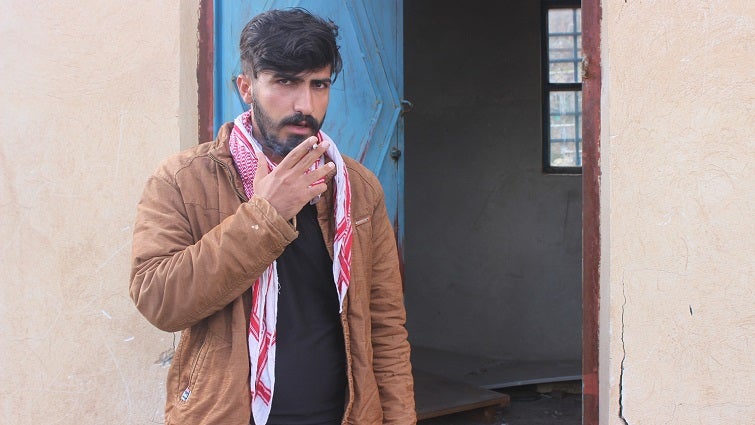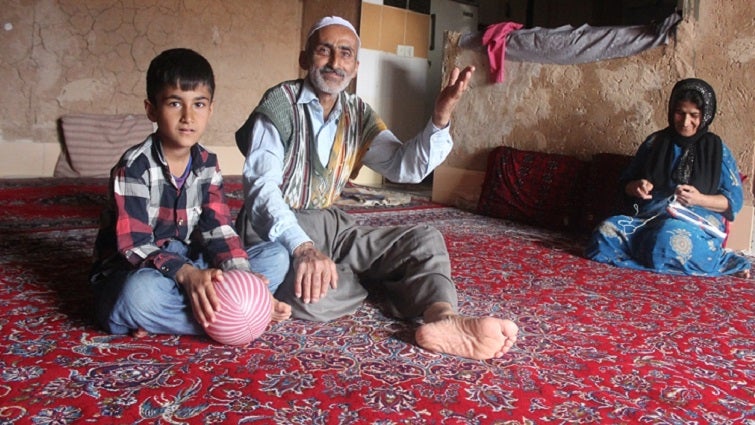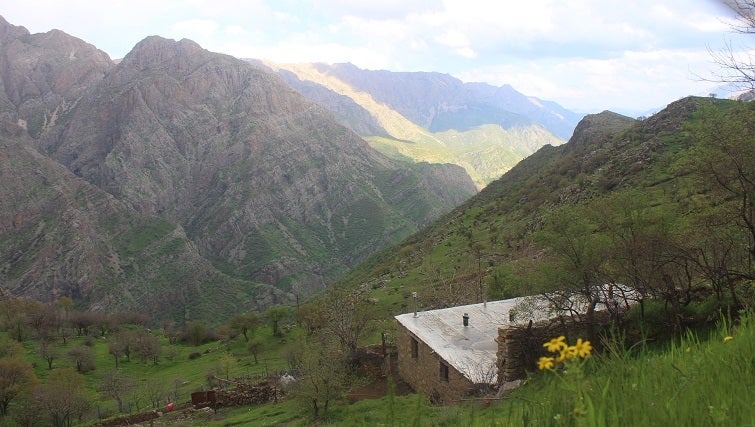
Farzad, a 21-year-old kolbar, poses in front of the mountains of Hawraman on the Iraq-Iran border. Photo taken on April 17, 2020 by Aso Mohammadi
HAWRAMAN, Iraq/Iran Border – Nameless, faceless, and their only protection each other, a regular pilgrimage crosses one of the world's most dangerous borders almost daily to transport foreign commodities to Iran's stifled markets.
They are known as "kolbars" – grey- and black-market couriers who carry heavy loads on their back to transport goods from the Kurdish region of Iraq into Iran — on foot. Traveling in groups, sometimes a huge caravan numbering over a thousand, sometimes just small enough for company on the arduous journey through winter snow and summer heat, they are proud to be known for their steadfast, backbreaking labor, which earns them just enough for a piece of bread for the road.
In these hard economic times, it's sometimes the only work people can get to feed their families. Monitors estimate around 70,000 people, mostly Iranian Kurds, make a living as kolbars.
The journey begins with the men, young and old, suiting up by tying their cargo to their bodies. The products can be anything that is easily sold in the sanctions-squeezed Iranian marketplace: cigarettes, alcohol, imported clothing, household electronics, television sets, or cell phones.
I meet Farzad shortly before he sets off on one of these journeys, sitting on a boulder, chain-smoking.
"Since corona has gotten serious in Iran," Farzad tells me, "we've been out of work and our lives have been turned upside down. There is nothing else for me to do, so I do kolbary."
Now 21 years old, he says he has been working as a kolbar for six years. "I was born in 1377 [1998-1999]," he says. "I finished high school. I've been doing kolbary for six years now. My family isn't well off. Ever since I was 14, they were already telling me to 'get a job, get a job'. And I couldn't take this situation anymore. I had no motivation to study. And no one in the house was supporting me, so I took this job and stopped studying. I had no skill in any area. Walking the borders needs no skill, only physical strength."

It sometimes takes days of trekking over the porous mountain border between Iran and Iraq. Their loads range from 30-40 kilograms. Some men boast tall tales of carrying a hundred kilograms on the journey, which can take anywhere from twelve hours to several days, if they have to stop and decamp. For this grueling labor, they are paid by the weight they carry, earning on average around 11,000 Iranian tomans, or about $2.61, per kilogram.
"I go for Kolbary an average of 15 days a month," says Farzad. "If the weather is fine, I might even go 20 days." The pay for each cargo depends on the prices for the day. One day it could be 10,000 tomans, one day it could be 20,000 [per kilo]. The most I ever got was around 500,000 tomans and the least was 100,000," Farzad told Rudaw English. "On average I make 5 to 6 million tomans per month," or more than $1,000.
Snow has covered the winding road to the border city of Uraman Takht. The first month of spring has already passed, but at this elevation, the snow has barely noticed. Every now and then, signs of spring peek out from the ledges of the rocky hills: a red flower on green grass, or the song of a mountain shepherd on a cliff, telling of poetic tales of kolbars, to ease the journey with warm themes of home and family.
The unforgiving weather is the least of the dangers facing kolbars on their journey. The entire mountain range that was once the site of a vicious war between the neighboring states, lasting from 1980 to 1988, but more reminiscent of the bitter trench warfare of World War One in Europe. Untold millions of landmines remain a hidden threat, and regularly claim a leg or the life of a kolbar.
But the greatest threat is Iranian border guards, who have been reported to fire on kolbar caravans with little to no repercussions.
An estimated 237 kolbars were shot by Iranian border guards in 2019, according to an Iranian human rights organization that tracks violations in the kolbar community.
In the same period, the Paris-based Kurdistan Human Rights Network has recorded 245 incidents that either killed or injured kolbars trekking goods over the border, in which 56 died and 153 were wounded. Another 23 kolbars froze to death in the mountains, drowned in rivers, or fell from cliffs.
Along the journey, kolbars make stops to rest, even camp for the night. As I pass the Koohsalan Mountain and stop in front of the Sirvan River, I am invited by a shepherd to come and have some tea at a humble mountain cottage. Here, Mohammad Moradi lives with his wife Nahida and their four children. The eldest, Hasan, is 20, and left the mountains for the big city of Tehran, where he works as a doorman. The 54-year-old Mohammad has now retired, and like many in this area he too worked as a kolbar until his back gave out.
Naturally over a hot cup of tea, Mohammad alternates between regaling stories of his time as a kolbar and complaining about the economic worries of the times. He sometimes goes to the border to trade whatever he can find, but says that his kolbary days are over. "My body can't take any more than that. After this disease came, they closed the border down and I couldn't go any more. But before that, when I would go, I then couldn't move or do anything for a whole week, I would come back home with almost no more control over my body," he says.
"One time I was carrying a 26 kg TV. I got 250,000 for it," he continues, the wrinkles on his face relaxing and contracting each time he sips his tea and remembers another detail to add to the story. "And on top of that was a whole sack full of cigarettes. I carried them to the top and to the winding road. On the way down I started pulling them on the ground until the end of the road. You should be very cautious, because if the load slips away from your hands, you should pay for the damages from your own pocket – then you're screwed. So then my pack slipped off my hands. It was going so fast, if it had hit someone, it would have taken their life. It was a bunch of cartons, one of them ripped open, and red Marlboro cigarettes on the white snow created a beautiful scene in the mountains. I was lucky it was only cigarettes. It took me until night to collect them all."
At that point, Nahida interrupts the story: "That day, he left at four in the morning and came back from the border at nine at night. Me and the kids were so worried about him. We thought – God forbid – something had happened to him. When he came back, you should have seen his face. It was like he'd come back from hell," she says, smiling at her husband.
The smuggling trade is an open secret in Iran – so much so that the supreme leader of Iran, Ali Khamenei, spoke against the trade in February 2017, stressing that the mafia bosses at the top who control and profit from the illegal trade cartels should be the target of the government's anti-smuggling efforts instead of the poverty-stricken kolbars who do the heavy lifting.
Still, in December 2018, the head of Iran’s Border Guard, Brigadier General Qasem Rezaei, railed against the kolbars, saying: "Every day and every night someone crosses the border illegally, calling himself a courier – crossing the border illegally is a red line for us."
A study published by the Global Initiative Against Transnational Organized Crime (GIATOC) in 2019 found that the black- and grey-market trade has flourished for years, taking only a slight dip in 2016 after sanctions on Iran were eased when UN inspectors confirmed Tehran had complied with the 2015 multilateral agreement to dismantle significant parts of its nuclear energy program.
"The lifting of sanctions meant Iran could re-enter the global economy, and its citizens were no longer so reliant on smuggled goods," the report stated. That momentary respite has now ended, with the United States withdrawing from the accord and exerting a campaign of "maximum pressure" on Iran.
Speaking at the Doha Forum in December 2018, Iran’s foreign minister, Mohammad Javad Zarif, stated: "We have successfully done business during the previous sanctions. If there is an art that we have perfected in Iran ... it is the art of evading sanctions."
The economic pincer effect brought on by the coronavirus and suffocating sanctions on Iran has hit poor workers, like those who resort to kolbary, the hardest. "Before corona, tomatoes would be 2,000 [tomans] per kilo, now they're 10,000," Mohammed tells me. To make matters worse, with the border closed, a key lifeline of trade income went with it, leaving no other option for many to continue walking the dangerous mountain pathways.
"It's so hard for us to have the border closed down," Mohammed explains. "Not just for us, it's the same for the other villages too. The other kolbars say to me, '20,000 tomans is of no use, but what else can we do to eat?' — and they're right. By God I'd be fine with having a job with that much pay, just so long as I didn't have to break my back."
Reporting by Aso Mohammadi, translation by Ruhollah Nakhaee










Comments
Rudaw moderates all comments submitted on our website. We welcome comments which are relevant to the article and encourage further discussion about the issues that matter to you. We also welcome constructive criticism about Rudaw.
To be approved for publication, however, your comments must meet our community guidelines.
We will not tolerate the following: profanity, threats, personal attacks, vulgarity, abuse (such as sexism, racism, homophobia or xenophobia), or commercial or personal promotion.
Comments that do not meet our guidelines will be rejected. Comments are not edited – they are either approved or rejected.
Post a comment